- Details
- Written by Gordon Prentice
Tonight (Monday 8 July 2019) is a big occasion for Tony Van Bynen - and for members of the Liberal Party in Newmarket-Aurora.
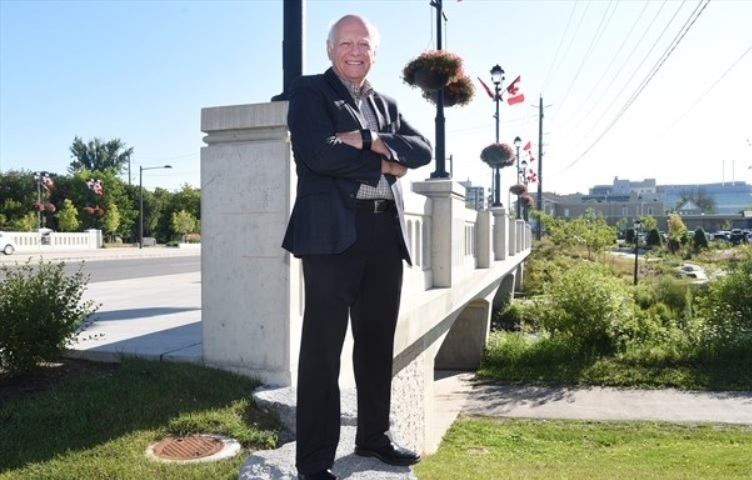
The 68 year-old Van Bynen who has spent 18 years in municipal politics being “steadfastly bipartisan” is being acclaimed at 7.30pm at the Royal Canadian Legion in Newmarket’s Srigley Street as the new Liberal candidate for the October Federal Election.
Van Bynen will address hundreds of Liberal Party activists expecting to be fired-up and motivated for the campaign ahead.
Van Bynen will not let them down. He has spent a lifetime preparing for this moment.
What will he say? Will he invite questions? Will the hat be passed around to help fill his campaign war chest?
Inspiration
He will tell his audience he draws inspiration from three famous leaders – the Dalai Lama, Martin Luther King and John A. Macdonald.
The Dalai Lama has certainly made his mark on the old banker. For years I have witnessed him at York Regional Council, head slightly bowed, deep in meditation, saying nothing.
And then there’s Martin Luther King whom Van Bynen admires for his social justice. We shall find out tonight whether Van Bynen's concern for social justice goes beyond mere neighbourliness which has been, until now, the defining core of his political beliefs.
Van Bynen also looks for inspiration to John A. Macdonald, praising the man’s vision and commitment to build. At a time when Justin Trudeau is trying hard to put relations with Canada’s First Nations on a sounder and less contentious footing, the old banker’s choice of Macdonald (who believed in the forced assimilation of indigenous peoples) may seem misjudged.
Priorities
But in any event, this is Van Bynen’s big opportunity to throw his natural banker’s caution to the winds and tell us what he really thinks about the challenges facing Canada. When he gets to Ottawa what will be his priorities?
Will we hear a call to arms or get one of those bland re-heated offerings that he used to dish out year-after-year to the local Chamber of Commerce, telling them how terrific Newmarket is? No. I think we can expect a rousing speech which sends shivers up the spine.
Van Bynen will want to speak out clearly and unequivocally about the things in Canada that need to change. If he sees injustice I expect him to shout about it, not look the other way.
This may be a tall order for a man who is happiest when dealing in woolly generalities, who rarely stakes out a position on controversial subjects unless he is absolutely forced into a corner. He tells us this is his golden rule:
“We need to listen to all perspectives”.
Pensions a priority? (other than his own)
How would that have worked when Sears Canada closed its doors at Upper Canada Mall? When the local Sears was selling off its stock at knockdown prices I recall conversations with Sears staff whose pensions were disappearing before their eyes. Whose side would the Voice for Fiscal Prudence have been on? And when he gets to Ottawa what will he do about it?
Van Bynen will talk about climate change but I doubt he will use the term “climate crisis” or even “climate emergency”. Even though Canada is warming twice as fast as the rest of the planet, that would probably be a step too far. He says:
“Climate change is very real and the Conservatives are pretending it is not a serious issue.”
Tonight he will laud the various initiatives taken at Newmarket Council such as solar panels and Soofa benches. But he won’t mention the York Regional Climate Change Action Plan. He chose not to comment when it came up for ratification on 16 November 2017. He missed the previous meeting when it was considered it detail (and that's OK) but was silent at full Council when he could have spoken. But that's entirely typical.
Follow the leader
We can thank the old banker’s long-time colleague, former councilor Dave Kerwin, for reminding us that Van Bynen is not a leader. It is best to think of him as a well-paid administrator. The old banker came up with this little gem in 2016:
“Leadership is as much about followership.”
I think he means we are all joined in a common pursuit, a common endeavour, the leaders and led. He just gets more money than the led.
When it is all over and Tony Van Bynen MP is comfortably settled in his new office in Ottawa, gazing out over the river, daydreaming, will he still block me from reading his tweets, as he does now?
Probably.
This email address is being protected from spambots. You need JavaScript enabled to view it.
Van Bynen told City Life Magazine his inspiration comes from “three famous leaders”
“I very much admire the Dalai Lama, because of his way of listening. Martin Luther King Jr. is someone whom I admire for his social justice. And when I think of John A. Macdonald, I think about the man’s vision on commitment and how to build.”
Update on 9 July 2019: And this is how Newmarket Today covered the meeting.
- Details
- Written by Gordon Prentice
The Federal Election on 21 October 2019 will be the second on the new riding boundaries for Newmarket-Aurora which were established in 2013. Before then the riding encompassed the two towns but now the southern boundary is at Wellington Street, severing Aurora, and the northern one is at Green Lane in East Gwillimbury. 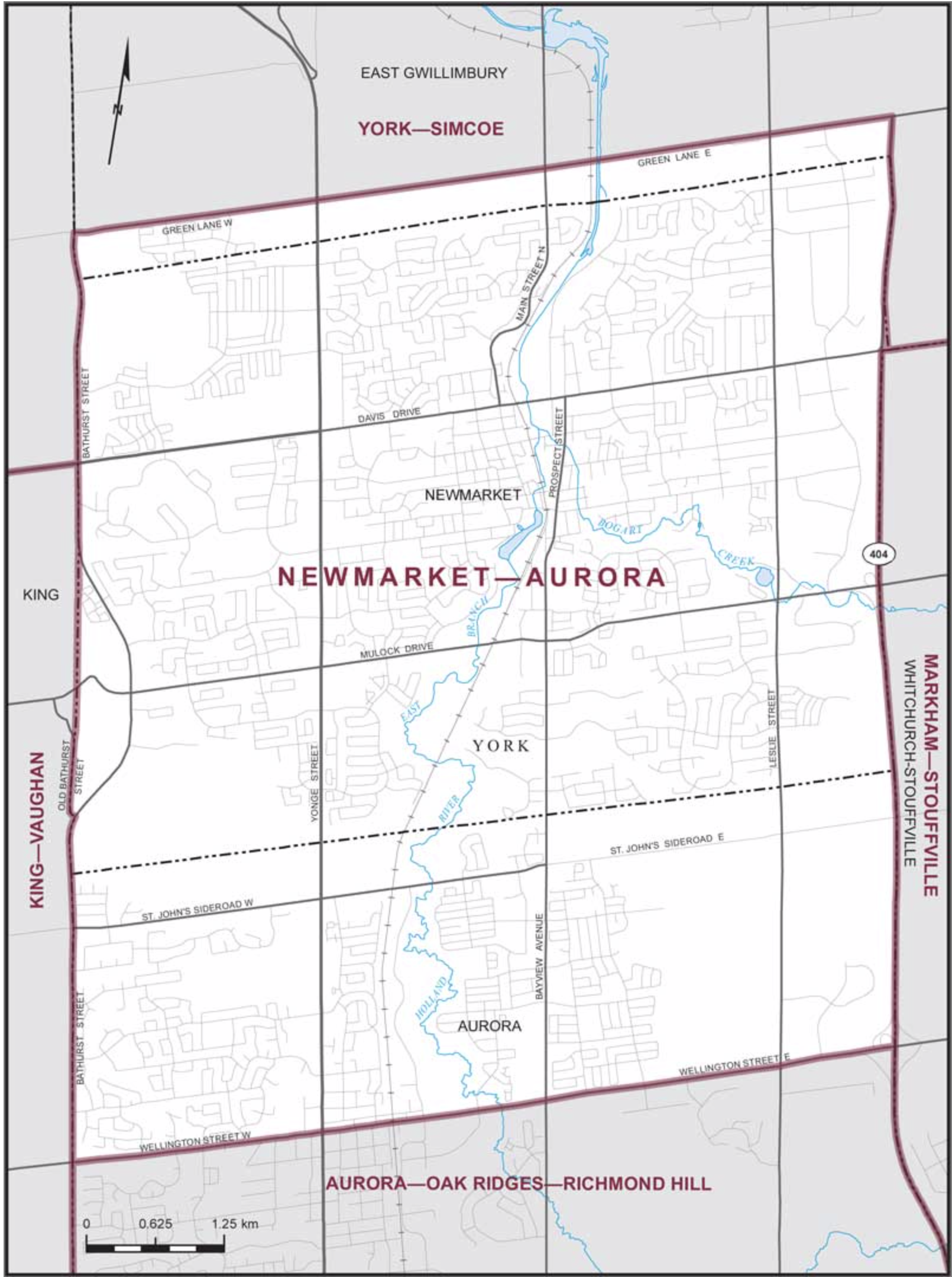
It is more prosperous than the average Canadian riding and leans Conservative.
Check the 2016 Census for Newmarket here and Aurora here. And to put it all in context here is an infographic from Statistics Canada showing income for Canadians in 2017. And the latest Canadian income survey is here.
The candidates
So far we have four candidates in the field. The sitting MPP, Liberal Kyle Peterson, is standing down after one term and the new Liberal standard-bearing is ex-banker Tony Van Bynen, twenty years his senior. The Conservatives are running the 64 year old re-tread Lois Brown who represented the riding from 2008-2015.
The NDP is once again putting its faith in Yvonne Kelly who ran a spirited campaign in 2015 but came third. She is an acknowledged expert in key social policy fields, chairing Ontario’s Social Planning Network and co-chairing the Social Planning Council of York Region.
The affable Walter Bauer, a professional engineer and expert witness, represents the Green Party. He ran unsuccessfully in Richmond Hill in last year’s Provincial election. He is often seen outside Christine Elliott’s constituency office on Fridays taking part in the regular protests about the Provincial Government’s cutbacks.
Maxime Bernier’s People’s Party of Canada has yet to select a candidate but is expected to do so. The irrepressible Dorian Baxter is also expected to throw his hat into the ring.
Odds on a Conservative win
The website 338Canada.com puts the odds of the Progressive Conservatives winning Newmarket-Aurora at 69% and the Liberals 31%. The website electionprediction.org whose evaluations are "entirely subjective" gives the seat to the Conservatives.
But who knows? The Liberals have a strong and resilient brand which could mask the obvious flaws of their standard-bearer, Tony Van Bynen, who is coming out of a comfortable retirement after being (in his own words) "steadfastly bipartisan" throughout his 18 years in municipal politics.
It is undeniably the case that the Conservatives are not polling as strongly in Ontario as elsewhere. This is likely to be the Ford factor at work. Buck-a-Beer is uniquely unpopular here. The latest polling averages in Ontario put the Liberals on 36.9% and the Conservatives trailing at 32.7%.
The old duopoly
Of course, it is not simply a choice between the Conservatives and the Liberals, the old duopoly. The Greens are polling well. And we shall see if, against all the pundits’ expectations, the NDP can get traction.
The key, as always, is persuading people to vote. In the Federal Election in Newmarket-Aurora in 2015 there were 83,351 electors. Turnout was 68.1% - just higher than the Ontario average of 67.8%.
This email address is being protected from spambots. You need JavaScript enabled to view it.
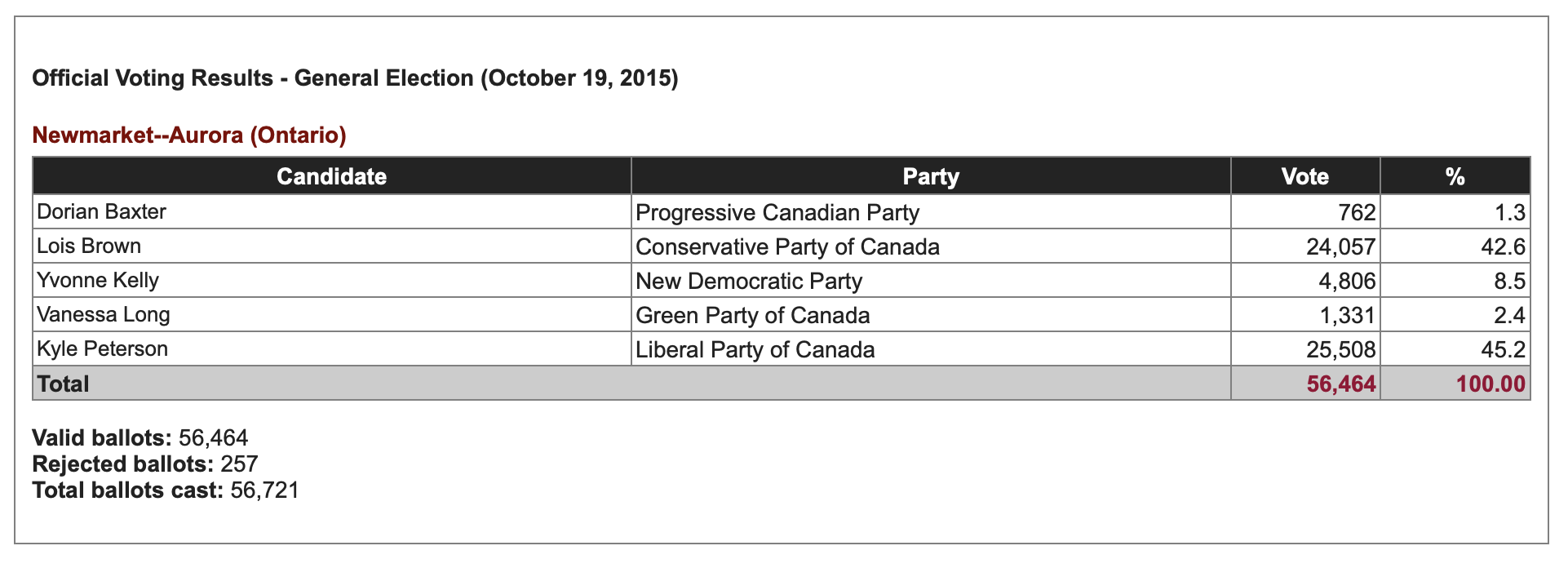
- Details
- Written by Gordon Prentice
Former Newmarket Mayor and wannabe Liberal MP Tony Van Bynen told election candidates in 2014 that “voters deserve facts”. 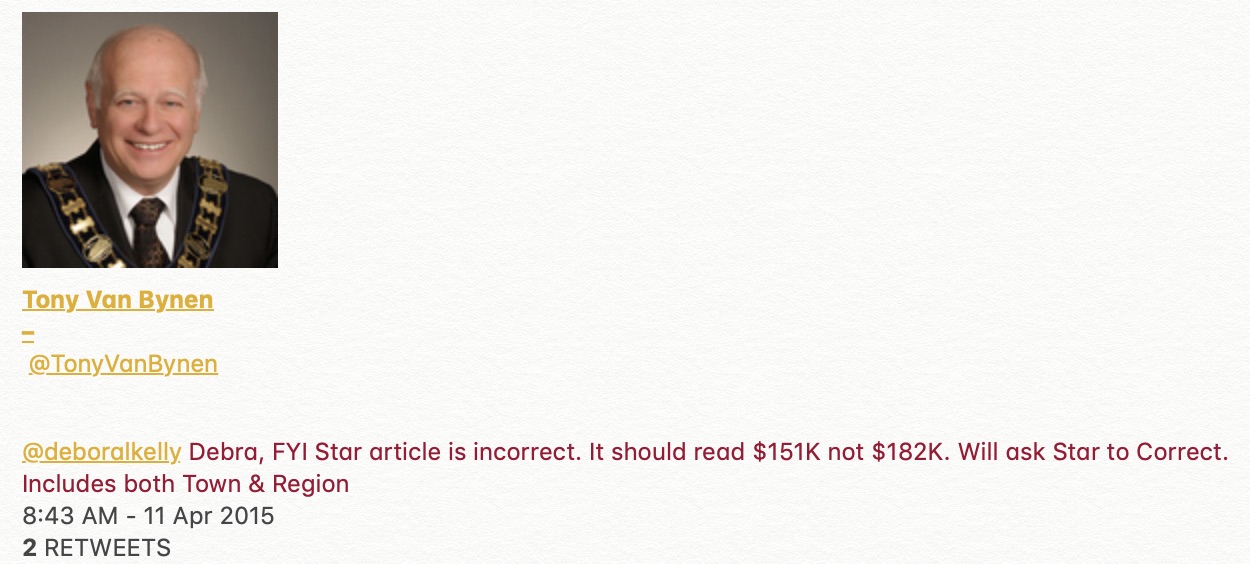
What he said then is still very relevant today. We don’t want to send someone to Ottawa who is economical with the actualité.
In 2014 in the run-up to the municipal election that year Van Bynen told us:
“Voters deserve facts. Using partial information to mislead residents is irresponsible and dishonest… All candidates have a duty to be truthful to those whom you seek to serve when you run for public office. Voters deserve facts.”
In April 2015, the Toronto Star ran a story which claimed Van Bynen received remuneration and benefits in 2014 totalling $182,000.
Incorrect
Van Bynen was offended by this, responding to journalist Debra Kelly by tweet on 11 April 2015:
“FYI Star article is incorrect. It should read $151K not $182K. Will ask Star to Correct. Includes both Town and Region.”
On 18 April 2015 the Star published a correction saying Van Bynen’s salary and benefits was misstated. It was not $182,000. It was rather $159,856.84.
In seven days Van Bynen’s $151,000 had morphed into $159,856.
Undisclosed payments
Van Bynen also did not declare (as he should by law have done) the $8,004 retainer from Newmarket Tay Hydro that he gets for sitting on the Board plus $200 a day for eight meetings in the course of the year. This comes to $9,604 which should be added to the $159,856 bringing his real remuneration up to $169,460. The Hydro sinecure goes with being Mayor.
The Sunshine List put Van Bynen’s salary and total taxable benefits for 2014 at $113,921.
The Sunshine List is, of course, deeply flawed. The Public Sector Salary Disclosure Act 1996 requires organisations that receive public funding from the Province of Ontario to make public, by 31 March each year, the names, positions, salaries and total taxable benefits of employees paid $100,000 or more in the previous calendar year. Its design excludes the $50,000+ “stipend” from York Region and income from the Hydro Board which Van Bynen only gets by virtue of being Mayor of Newmarket.
Benefits
I do not comment here on the rich array of benefits Van Bynen enjoyed in 2014 – the leased car paid for by the taxpayers, the maintenance costs, the iPad, the free phone, OMERS, Canada Pension Plan, life insurance, health and dental cover and all the rest. And then there are the infamous free lunches. Years of dining out on our dollar.
As we gear up for the 2019 Federal Election I hope our wannabe Liberal MP will remember his stern warnings of five years ago when he told candidates for elected office they had a duty to be truthful and not play fast and loose with the facts.
For voters in Newmarket-Aurora who are leaning Liberal and want an MP who knows how to manage his money then the Voice for Fiscal Prudence is the man for you, watching out for your interests while looking after his own.
This email address is being protected from spambots. You need JavaScript enabled to view it.

The Newmarket statement of remuneration and expenses 2014 is here. And York Region's Statement of Remuneration for 2014 is here. And this is how the Canada Revenue Agency deals with severance payments.

- Details
- Written by Gordon Prentice
They’ve done it again! 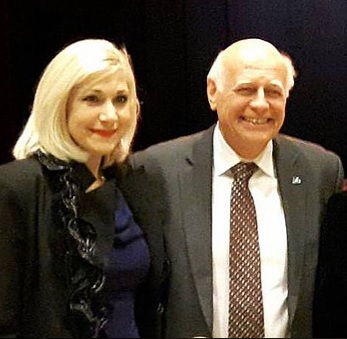
The Newmarket-Aurora Liberal Party will be acclaiming their candidate for the forthcoming Federal Election at 7.30pm on Monday 8 July 2019 at the Royal Canadian Legion in Srigley Street, Newmarket.
The Newmarket-Aurora Liberal Association says:
“Tony Van Bynen is the only qualified nomination contestant to have successfully completed the nomination application process. Therefore, Tony will be acclaimed at the nomination meeting as our Liberal candidate in the next general election in October.”
The current MP, Kyle Peterson, was also acclaimed as no one else threw their hat into the ring.
Jackie Playter (who stresses she is not Van Bynen’s campaign manager!) tells me it was a struggle to find the required 150 Liberals to nominate him. Still, he got over the finish line and he’ll soon be on his way to Ottawa, fizzing with ideas, ready to change the world - and be a voice for fiscal prudence.
This email address is being protected from spambots. You need JavaScript enabled to view it.
(Photo right shows former PC Provincial candidate Charity McGrath with the Voice for Fiscal Prudence)
- Details
- Written by Gordon Prentice
Who could possibly begrudge our former Mayor Tony Van Bynen his severance pay of $95,631.11?
Surely all reasonable people believe he deserves to be compensated for his altered circumstances? As a private citizen he is, for example, no longer able to bill his lunches to the taxpayer. 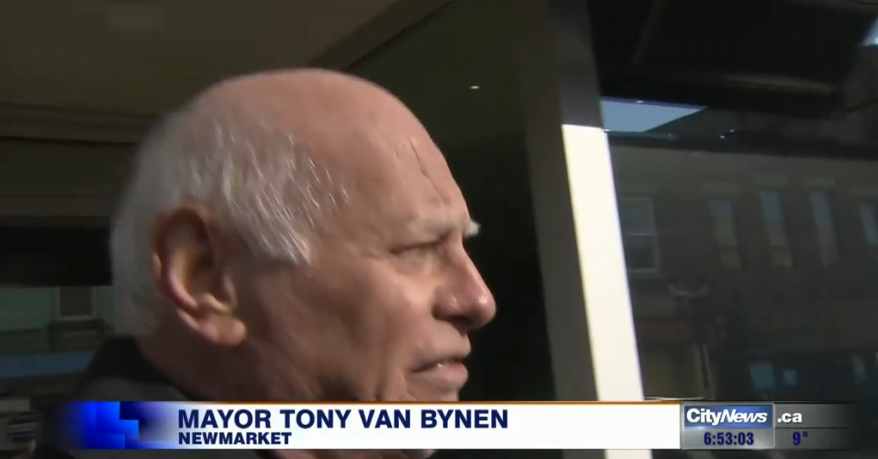
Throughout his long municipal career he has largely kept out of trouble by following the old maxim:
“Never complain; never explain”
Even when Darryl Wolk was yelling at him about his Mayoral compensation he kept his cool, not taking the bait. He has always been able to deflect criticism by pointing us to policies and practices and common-standards and nothing-being-out-of-the-ordinary.
He is now a wannabe Liberal MP and has all that cash stuffed into his back pocket. But, as sure as night follows day, he will be asking Liberal minded folk in Newmarket-Aurora to help finance his election campaign. I’d bet on it.
Double-dipping
Our wannabe MP tells Teresa Latchford:
“It’s not unique and severance is part of the overall compensation package. It is all part of what the market has provided and other municipal service employees get severance.”
“If I am successful (and become Newmarket-Aurora’s MP), the federal position won’t start until later in the year so there is no double dipping.”
Van Bynen knows all about double dipping. He has always pointed to the Sunshine List as a true indicator of his municipal income yet the old banker knows it is as phoney as a three dollar bill.
It does not distinguish between municipal politicians who receive one-third of their remuneration tax free (like Van Bynen) and others from Municipalites such as Hamilton where the politicians had bravely gotten rid of it. It distorts comparisons. In fact, it makes them next to impossible.
Fortunately, the Federal Government has now taken away this generous concession.
Back in March 2017 Newmarket Council voted to keep the cash on the grounds it would amount to a 10% - 15% cut in their take home pay.
And then they had second thoughts.
Consultant's report on pay is off-limits
In April last year our elected officials received a report from Associum Consultants which impertinently suggested at least some of our councillors were getting paid too much. When I tried to get a copy of the complete unredacted report so I could fully understand the consultant’s reasoning my Freedom of Information request was blocked. I was told information from third parties would be revealed. (The Associum Report is here at page 170)
So the Town has yet to take a view on Council remuneration but a report is supposed to be coming later this year. In the meantime Council pay has not been grossed up to compensate for the removal of the 1/3rd tax free provision.
I believe our elected officials should get the rate for the job. No question. They do important work on our behalf and they should be properly and fairly rewarded, including severance pay. But, as a quid pro quo, there should be absolute transparency so we all know where the dollars come from and we can compare apples with apples.
Sunshine List
Tony Van Bynen would rather have his teeth pulled than volunteer information on his remuneration. Over the years he has had a million opportunities to put the record straight and point out the defects of the Sunshine List. Its flawed design masked the true take home pay of municipal politicians. But he chose to obfuscate.
Our wannabe Liberal MP Tony Van Bynen has spent a lifetime laughing all the way to the bank, milking the system.
This email address is being protected from spambots. You need JavaScript enabled to view it.
The Town tells me Newmarket's 13 comparators for setting the remuneration of elected officials (and which were established through an external consultant review) are: Ajax, Aurora, Barrie, Burlington, Caledon, Halton Hills, Markham, Milton, Oshawa, Pickering, Richmond Hill, Vaughan and Whitby.
I am told the comparators were derived from, but not limited to, municipalities meeting the following criteria:
Population of approx. 50,000 to 250,000
Municipalities with a Ward system (but Aurora has an at-large system?)
Location in similar proximity to the GTA and municipalities in surrounding areas (including York and Durham Region communities
2-tiered governance systems (municipal and regional)
Severance and the Chair of York Regional Council, Wayne Emmerson.
Page 124 of 287